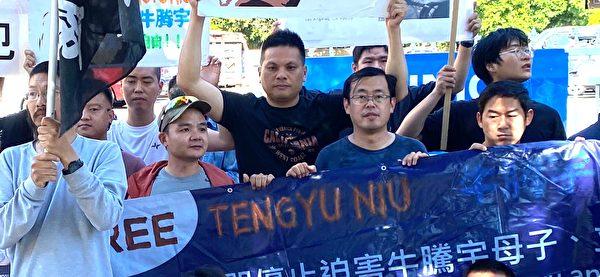Several rights activists in Los Angeles recently informed The Epoch Times that authorities allegedly threatened their family members in China due to their participation in an event marking the anniversary of the Tiananmen Square massacre earlier this month.
Los Angeles resident Zhang Ren, a former human rights lawyer, pointed out that the Chinese authorities’ actions were unlawful and encouraged more young Chinese to stand up against the Chinese Communist Party’s (CCP’s) atrocities.
On June 4, hundreds of people from various groups gathered outside the Chinese Consulate in Los Angeles to commemorate the 35th anniversary of the 1989 Tiananmen Square massacre.
The spokesperson of Hong Kong Forum Los Angeles said that despite the CCP’s efforts to suppress and intimidate its critics, the group remains steadfast in commemorating this important chapter of history, marked by bloodshed and tears.
Following the LA memorial event, some members of the China Democracy Party who attended told the Chinese edition of The Epoch Times that between June 15 and June 21, Chinese authorities threatened their families back home.
Authorities Threaten Family Members
Xiang Guiyuan, a native of Huaihua, Hunan Province, recounted how her parents allegedly received threatening phone calls from Chinese police after she participated in the June 4 memorials this year and last year. “The Chinese police [told my parents that] I was engaged in illegal activities overseas,” she said.
Ms. Xiang said that the CCP’s attempts to exert control do not intimidate her, and her decision to come to the United States has only strengthened her resolve to resist communist influence and embrace the freedom of speech cherished in America. “If they think they can threaten me in this manner, they are mistaken,” she said.
Ms. Xiang arrived in the United States last year and is currently applying for asylum.
Driven by a growing awareness of the CCP’s oppression, other Chinese immigrants like Ms. Xiang actively engage in anti-CCP demonstrations in different U.S. cities. However, they frequently encounter harassment from the regime, which employs various surveillance methods to monitor their activities and intimidate their relatives in China.

Yang Zhiang, a native of Hefei, Anhui Province, shared that three policemen and a community staff member first visited his parents in his hometown on June 8.
As of June 21, the police visited his parents three times, accusing them of not raising their son in an upright manner. “My mother is illiterate and was very scared, thinking I committed a serious crime,” he said.
Mr. Yang wondered whether the regime would also arrest the parents of corrupt officials.
He condemned the CCP for harassing his parents and not taking into account that he took part in a peaceful June 4 memorial.

Li Jicheng, an internet start-up owner from Shandong Province, recounted how police visited his parents in Tai’an and threatened them following his participation in the event outside the Chinese Consulate in Los Angeles.
“On June 7, police went to my parents’ home and threatened them, urging them to persuade me to return to China and surrender,” he said, adding that his father was afraid during the incident.
“They warned of possible imprisonment and instructed me to behave and cease activities that could tarnish the CCP’s image.
“Everything I do abroad aligns with basic human rights and normal conduct,” he said.
‘Hope for China’
In response to authorities’ blaming parents for failing to properly educate their children and prevent them from opposing the CCP, Mr. Zhang said: “Once a child turns 18, they become legally independent individuals responsible for their own actions. Parents should not be implicated or held accountable.”
He pointed out that the younger generation’s ability to discern right from wrong and think independently suggests successful parenting.
As an expert on Chinese law, Mr. Zhang said: “According to China’s Civil Code, every person possesses dignity and an independent personality that should not be interfered with. The Chinese police’s accusations against parents lack legal basis.”
Highlighting the importance of jurisdictional legality, Mr. Zhang pointed out that protesting at Chinese Consulates in the United States falls outside the CCP’s authority.
He has witnessed a growing number of young Chinese speaking out against the Party, giving him hope. “They should be encouraged. When more young people in China can resist indoctrination and bravely oppose oppression, there is hope for China,” he concluded.
Hong Li and Shawn Ma contributed to this report.
Source link






































Add comment